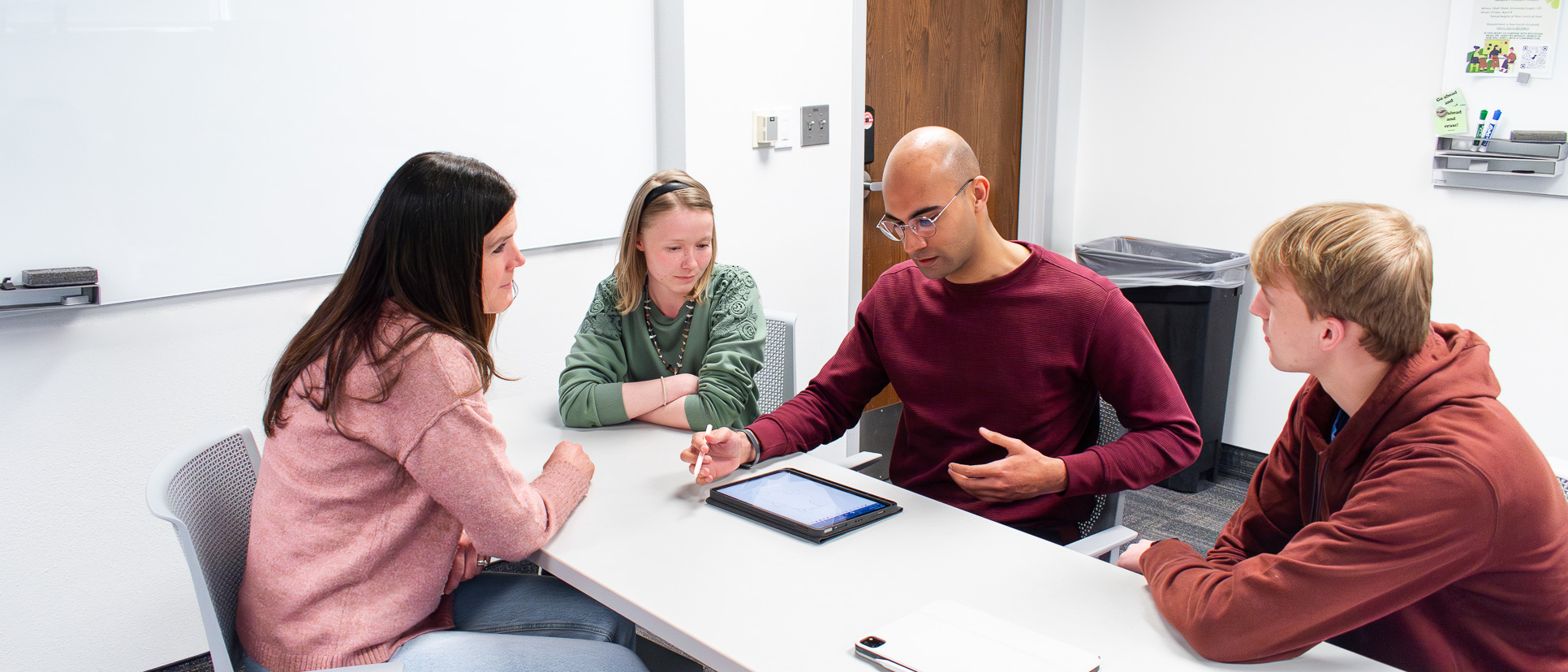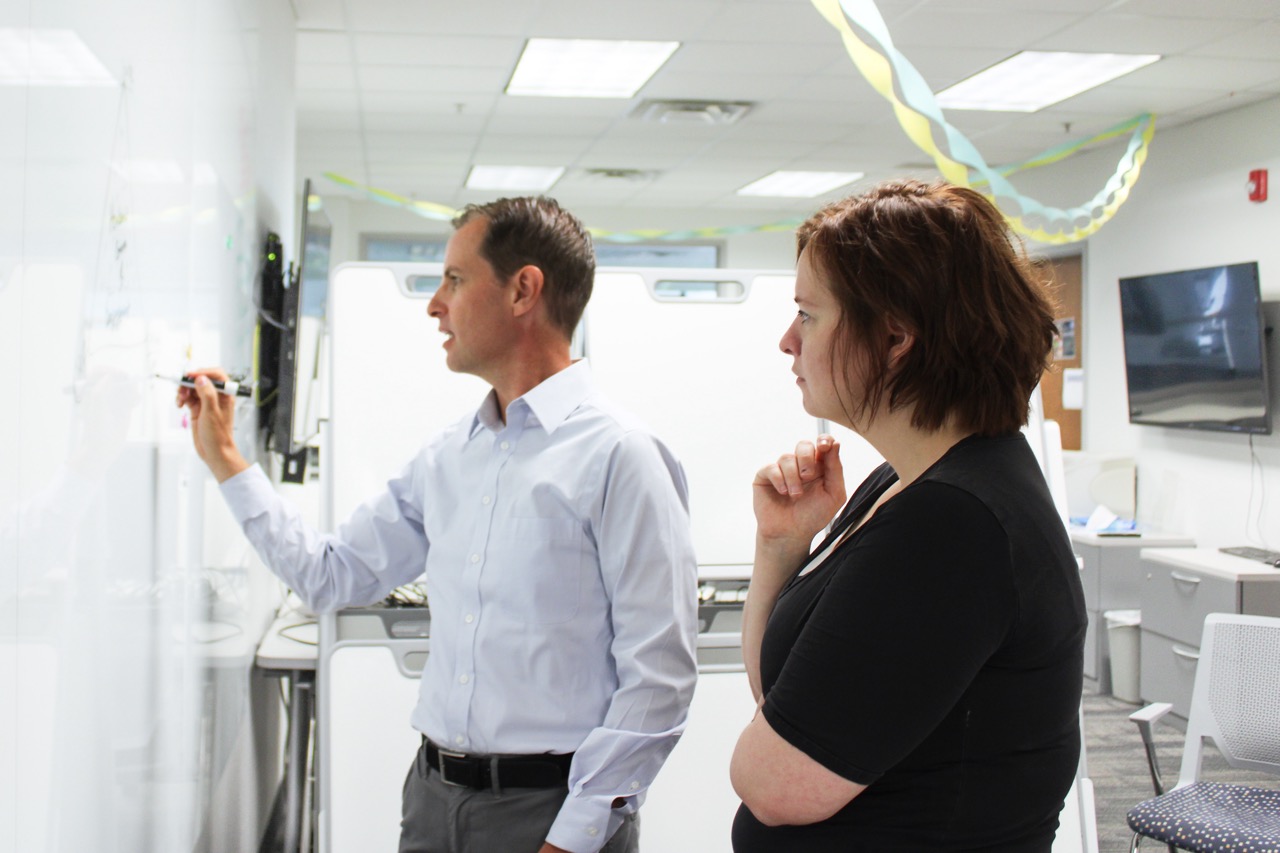Program Overview
MS of Instructional Psychology and Technology
Overview
Our Savior, Jesus Christ, was, and is, a designer. "All things were made by him" (see John 1:3, 10), through design processes (see Moses 3:5), design attributes (see Alma 42:15), working within a design community (see Abraham 4:1), and because of divine love and empathy (see 1 Nephi 11:13-33).
In the Master's Degree program in the Instructional Psychology and Technology Department, we follow the example of the Master Designer by preparing learning and instructional design professionals who:
- Apply theory and psychology in strategic and evidence-backed ways;
- Develop personal instructional, technical, and creative skills;
- Understand how to manage instructional design teams and processes;
- Support each other as a design community in helping each person achieve their potential; and
- Understand empathy, agency, and love as essential to designing learning that touches hearts, inspires minds, and elevates people.
Course List
Core Credits for Research
- IP&T 510 - Scholarly Writing and Argumentation
- IP&T 520 - Foundations of Technology
- IP&T 629 - Introduction to Research
- IP&T 651 - (IP&T - CPSE) Statistics 1: Foundations
- IP&T 653 - (IP&T - CPSE) Qualitative Research 1 (Intro to Qualitative Research)
Specialization Courses for Research
- IP&T 515 – Special Topics in Instructional Technology
- IP&T 531 – Introduction to Open Education
- IP&T 538 - Teaching in Online and Blended Learning Environments
- IP&T 560 - Instructional Product Development
- IP&T 564 - Instructional Design
- IP&T 620 - Principles of Learning
- IP&T 652 - Assessing Learning Outcomes
- IP&T 655 - Digital Interface Design
- IP&T 660 - Intermediate eLearning Development
- IP&T 661 - Introduction to Evaluation in Education
- IP&T 664 – Advanced Instructional Design
- IP&T 665 – Instructional Visual/Video Production
- IP&T 682 – Project & Instructional Resource Management
- IP&T 692 – Advanced Topics
- IP&T 730 – Hierarchical Linear Modeling
- IP&T 745 – Statistics 2: Multiple Regression
- IP&T 747 – Structural Equation Modeling
- IP&T 750 – Literature Review & Synthesis
- IP&T 752 – Measurement Theory
- IP&T 753 – Qualitative Research 2
- IP&T 760 – Advanced E-Learning Development
- IP&T 761 – Advanced Evaluation
- IP&T 789 – Meta-Analysis
Core Credits for Design/Development
- IP&T 510 - Scholarly Writing and Argumentation
- IP&T 520 - Foundations of Technology
- IPT 560 - Instructional Product Development
- IP&T 564 - Instructional Design
- IP&T 664R - Advanced Instructional Design
Specialization Courses Design/Development
- IP&T 515 – Special Topics in Instructional Technology
- IP&T 531 – Introduction to Open Education
- IP&T 538 - Teaching in Online and Blended Learning Environments
- IP&T 620 - Principles of Learning
- IP&T 629 - Introduction to Research
- IP&T 651 - (IP&T - CPSE) Statistics 1: Foundations
- IP&T 652 - Assessing Learning Outcomes
- IP&T 653 - (IP&T - CPSE) Qualitative Research 1 (Intro to Qualitative Research)
- IP&T 655 - Digital Interface Design
- IP&T 660 - Intermediate eLearning Development
- IP&T 661 - Introduction to Evaluation in Education
- IP&T 665 – Instructional Visual/Video Production
- IP&T 682 – Project & Instructional Resource Management
- IP&T 692 – Advanced Topics
- IP&T 730 – Hierarchical Linear Modeling
- IP&T 745 – Statistics 2: Multiple Regression
- IP&T 747 – Structural Equation Modeling
- IP&T 750 – Literature Review & Synthesis
- IP&T 752 – Measurement Theory
- IP&T 753 – Qualitative Research 2
- IP&T 760 – Advanced E-Learning Development
- IP&T 761 – Advanced Evaluation
- IP&T 789 – Meta-Analysis
Choose a Track
Design and Development
The Design and Development Track is intended to prepare students for work as an instructional designer, in corporate, government, and higher education settings. Instructional designers typically work in diversely skilled teams of professionals to design and develop learning materials. For example, a common team might consist of: an instructional designer, a content-matter specialist, a project manager, a graphic designer, a multimedia specialist, a developer, and a writer. As a designer, you should develop a skillset that enables you to contribute a specific skill to this team as well as a general ability to understand the other members’ roles so that you can communicate effectively
Research
The research track is for students considering doctoral degrees and future academic careers. It is designed to provide a strong foundation in research skills, in both qualitative and quantitative methodologies, that will prepare a student for a research thesis, journal publication, and future doctoral coursework.
Graduation Requirements
40 credits
- 15 credits of core courses
- 15 credits of specialized courses
- 3 credits of internship
- 1 credit of seminar
- 6 credits of Master’s project or thesis
Internship
Register for 3 credit hours of IP&T 599R during any semester or term.
Thesis/Project Work
Complete a total of 6 hours of Master’s project or thesis credit in order to graduate. These credits may be taken over a period of one or two semesters, as the student prepares the prospectus, conducts the project, and writes the report.
Oral exam
The Final Oral Examination should be scheduled with the Department Secretary. An oral exam may take from 1-4 hours, but typically lasts about 2 hours.
How to Apply
Submit Program Application
Priority Deadline: January 15
Submit program application through Graduate Studies.
Submit Proper Documents
- GRE or Portfolio
- Grade transcripts
- 3 letters of recommendation
- Letter of intent
- Resume








